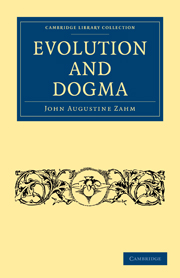Book contents
- Frontmatter
- PREFATORY NOTE
- Contents
- INTRODUCTION
- PART I EVOLUTION, PAST AND PRESENT
- PART II EVOLUTION AND DOGMA
- CHAPTER I MISCONCEPTIONS OF THEORY, ERRORS IN DOCTRINE AND MISTAKES IN TERMINOLOGY
- CHAPTER II MONISM AND EVOLUTION
- CHAPTER III AGNOSTICISM AND EVOLUTION
- CHAPTER IV THEISM AND EVOLUTION
- CHAPTER V THE ORIGIN AND NATURE OF LIFE
- CHAPTER VI THE SIMIAN ORIGIN OF MAN
- CHAPTER VII TELEOLOGY, OLD AND NEW
- CHAPTER VIII RETROSPECT, REFLECTIONS AND CONCLUSION
- AUTHORS AND WORKS CITED IN “EVOLUTION AND DOGMA.”
- GENERAL INDEX
CHAPTER VI - THE SIMIAN ORIGIN OF MAN
Published online by Cambridge University Press: 29 August 2010
- Frontmatter
- PREFATORY NOTE
- Contents
- INTRODUCTION
- PART I EVOLUTION, PAST AND PRESENT
- PART II EVOLUTION AND DOGMA
- CHAPTER I MISCONCEPTIONS OF THEORY, ERRORS IN DOCTRINE AND MISTAKES IN TERMINOLOGY
- CHAPTER II MONISM AND EVOLUTION
- CHAPTER III AGNOSTICISM AND EVOLUTION
- CHAPTER IV THEISM AND EVOLUTION
- CHAPTER V THE ORIGIN AND NATURE OF LIFE
- CHAPTER VI THE SIMIAN ORIGIN OF MAN
- CHAPTER VII TELEOLOGY, OLD AND NEW
- CHAPTER VIII RETROSPECT, REFLECTIONS AND CONCLUSION
- AUTHORS AND WORKS CITED IN “EVOLUTION AND DOGMA.”
- GENERAL INDEX
Summary
The Missing Link
ANOTHER question in connection with Evolution which has attracted even greater attention than spontaneous generation, is that respecting the animal origin of man. If it be true that living has evolved from not-living matter; if it be admitted that the higher are genetically related to the lower forms of life, then, we are told, the only logical inference is that man is descended from some form of animal. With the majority of contemporary non-Catholic evolutionists, the conviction of the truth of man's animal origin is so strong, that it is accepted as a fact which no longer admits of doubt. According to their view, all that remains is to trace man's relationship with his dumb predecessor, to discover the “missing link” which connects him with the beasts of the field, and the controversy is closed forever.
Here again, as in the case of spontaneous generation, we must carefully discriminate between fact and theory; between positive evidence for man's simian genealogy, and the various assumptions which so many evolutionists are ever too ready to ask us to accept.
I can do no better than reproduce here the testimony of one who will not be accused of bias towards Theism; who, far from being opposed to the theory of man's descent from the ape, most strongly favors it, but who insists on having evidence of such connection before giving his assent. I refer to the celebrated anatomist and anthropologist, Dr. Rudolph Virchow, than whom no one is more competent to give an opinion on this much-vexed question.
- Type
- Chapter
- Information
- Evolution and Dogma , pp. 340 - 368Publisher: Cambridge University PressPrint publication year: 2009First published in: 1896



